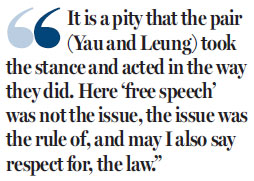A reminder that Hong Kong is an inalienable part of China
Updated: 2016-11-29 07:43
By Claudio de Bedin(HK Edition)
|
|||||||||
On Oct 12, the pro-independence duo, Sixtus Leung Chung-hang and Yau Wai-ching, altered their Legislative Council oaths and pledged allegiance to the "Hong Kong nation", and replaced "China" with the derogatory term "Shina". While taking their oaths, they displayed a banner proclaiming, "Hong Kong is not China". Chief Executive Leung Chun-ying and Secretary for Justice Rimsky Yuen Kwok-keung applied for a judicial review to prohibit the pair from retaking their oaths.
The main issue at play is whether the "pair" should be permitted to retake their oaths. Article 104 of the Basic Law provides that when assuming office, legislators "must, in accordance with the law, swear to uphold the Basic Lawand swear allegiance to the Hong Kong Special Administrative Region of the People's Republic of China".
Their provocative oaths prompted the Standing Committee of the National People's Congress (NPCSC) to step in and offer its interpretation of the Basic Law. In the interpretation, the NPCSC laid down four general principles for oath-taking to clarify the meaning of "in accordance with the law, swear". In essence, legislators must take an oath before assuming office and the oath must be taken "sincerely and solemnly", and the oath-taker must "accurately, completely" read out the oath. People who take their oath in a manner that is not "sincere and solemn" will be disqualified from assuming office.
Some argue that the interpretation by the NPCSC is an intervention into the principle of "One Country, Two Systems" and that it interferes with Hong Kong's judicial independence and high degree of autonomy. The NPCSC has a constitutional right under Article 158 of the Basic Law to interpret Hong Kong's constitutional document. Under Article 158, the NPCSC has the power of final interpretation and its decisions are binding on all the courts of Hong Kong. Thus far, the NPCSC has exercised considerable self-restraint in its power of interpretation and has only exercised its powers five times since 1997. To argue that the NPCSC "intervened" in the principle of "One Country, Two Systems" is in my view misleading and incorrect. The NPCSC has this right. Whether it should have been used on this occasion can be argued from opposing political viewpoints but to contend that the exercise of this right is an "intervention" is, to my mind, incorrect because the NPCSC has a legal right to do so.

On Nov 16, a week after the NPCSC interpretation, the High Court held that Leung and Yau were to be precluded from retaking their oaths before the Legislative Council. Justice Thomas Au Hing-cheung stated that his decision would have been the same even without the NPCSC's interpretation. Justice Au's judgment provides a thorough analysis of the Basic Law, the Oaths and Declarations Ordinance (Cap 11), and a general perspective of oath-taking in common law. His judgment made little reference to the NPCSC's interpretation, but was consistent with the NPCSC's interpretation, the Oaths and Declarations Ordinance and the common law - all of which require oath-takers to "faithfully and sincerely" make an oath. Where it is an oath of allegiance, the manner must indicate loyalty and support to the government and constitution.
Of particular note in Justice Au's judgment is the emphasis that the "duo" had breached the principle of "One Country, Two Systems". The manner of the oath-taking, by referring to the "Hong Kong nation", and their brandishing of the banner bearing the slogan "Hong Kong is not China", was deemed by judge Au to express the position that they did not recognize Hong Kong as a part of China. Thus their "manner" of oath-taking was viewed as not showing the requisite "faithfulness and sincerity" in supporting the Basic Law and the Hong Kong Special Administrative Region of the People's Republic of China. To my mind the judgment is clear and follows the basic principles of common law.
Further, the principle of "One Country, Two Systems" is firmly entrenched in Hong Kong's Basic Law and is fundamental to the establishment and continued success of the HKSAR. One must not forget that the recognition of "One Country" is the prerequisite to "Two Systems". The political and economic differences between Hong Kong and the Chinese mainland prior to the reunification necessitated the introduction of this principle to guarantee the unity of Hong Kong as a part of China while still maintaining the existing systems in Hong Kong. The preamble of the Basic Law and numerous articles reiterate that Hong Kong is an inalienable part of China. This is not a matter for discussion, it is a fact.
It is a pity that the pair took the stance and acted in the way they did. Here "free speech" was not the issue, the issue was the rule of, and may I also say respect for, the law.
The author is a partner of a Hong Kong law firm.
(HK Edition 11/29/2016 page10)